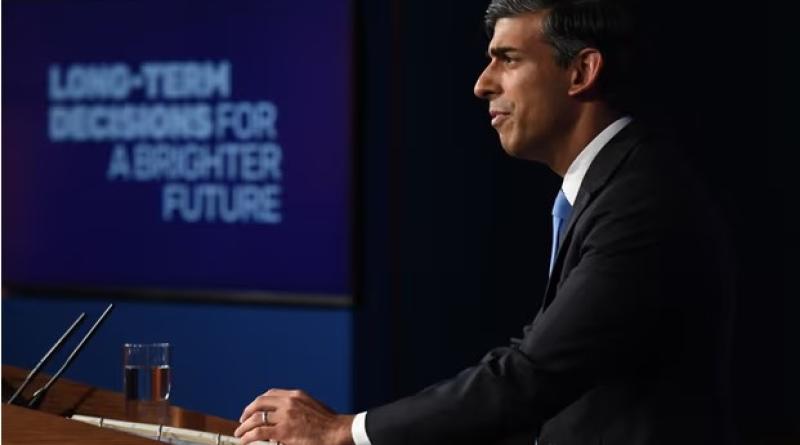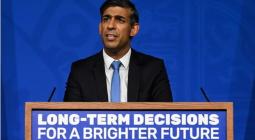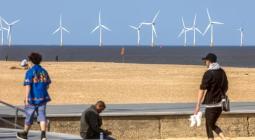‘The worst kind of culture war’: Tories attack Rishi Sunak’s reversal on net zero

The prime minister’s attempts to turn the climate emergency into a US-style wedge issue have dismayed veteran MPs who champion green policies
Rishi Sunak’s decision to drive a “green wedge” between the Conservatives and Labour will take the UK into dangerous new political territory and “the worst kind of culture wars”, not seen for more than 30 years, senior Tory figures and political observers have warned.
Reversals and delays to net zero policy announced last week will be just the start of a general election campaign in which the UK’s longstanding cross-party political consensus on climate will be increasingly at stake. Emails sent to journalists from the Conservative campaign headquarters revealed lines of attack on targets including the independent Climate Change Committee and Labour’s proposed £28bn investment in a low-carbon economy.
Sunak, announcing a five-year delay to the ban on new petrol and diesel cars, and a watering-down of the phase-out of gas boilers, also claimed to scrap nonexistent taxes on meat and flying, the imposition of seven bins and forced car-sharing – and the CCHQ emails encouraged the media to target Labour over these phantom policies.
For veteran champions of climate policy, these attacks are a novel and threatening development – since the late 1980s, measures to tackle the climate crisis have had common backing across the political spectrum.
Lord Goldsmith, a former Tory minister, told the Observer: “It’s not so much the individual measures he’s announced. It’s more about the language and politics. This is a clear attempt to turn the environment into a wedge issue, as it is in the US. We have managed to avoid that until now, with disagreements mostly being about means, not ends. Sacrificing the environment to culture wars is cynical, devastating and wildly irresponsible.”
Sunak repeated many times that he was still committed to the UK’s legally binding target of reaching net zero by 2050, though experts said the policy changes were more likely to hamper than help. But Chris Skidmore, the Conservative ex-minister and author of the government’s net zero review, accused the prime minister of misleading voters. “It’s especially worrying that false claims and disinformation are being made about meat taxes that have never existed, or compulsory car sharing, or having seven bins. This is completely untrue, and is the worst kind of culture war politics, attempting to deliberately mislead,” he told the Observer.
Some political observers said there was still time for the government to pull back from the brink. “It’s too soon to say the cross-party consensus is cracking, but it is in danger,” said Tom Burke, a former government adviser and co-founder of the green thinktank E3G. “This is a big mistake by the Tories, it will not help them much, and it’s desperate.”
Shaun Spiers, executive director of the Green Alliance thinktank, added that it was possible the PM’s blows against net zero policy were “more sound and fury than anything substantial” but warned they should stop. “If this is the way the Conservative party is going to work, it will fracture the consensus on the climate,” he said. “If Sunak wants to go further, then the consensus will be in deep trouble.”
Attempts to create divisions over the climate contrast sharply with the last general election, in December 2019, when all major parties had commitments to the target of net zero greenhouse gas emissions by 2050. The main green point of contention in their manifestos was over which could cut carbon fastest.
This cross-party approach has been a feature of British politics since the days of Margaret Thatcher. A chemist by training, she grasped the potential impacts of burgeoning carbon emissions on global heating. After the success of signing a global UN treaty to save the ozone layer, the Montreal Protocol in 1987, she moved quickly to attempt the same for greenhouse gases, making a landmark speech at the UN general assembly in 1989, calling for concerted action.
Sunak, by contrast, did not even attend the UN gathering this month. Just hours after the UN secretary general António Guterres warned world leaders that humanity had “opened the gates of hell”, Sunak made his speech watering down UK policy.
Other self-identified “green Tories” are less concerned about the change of direction. One told the Observer the announced changes on electric vehicles and boilers, and scrapping proposals to force landlords to make their tenants’ homes more energy efficient, were “not going to slow the dial that much [on cutting emissions]. This is why I have been broadly supportive of the pragmatic approach.”
When it comes to voters, the signs are that the UK public values the cross-party consensus, with more than two-thirds in most polls putting climate action as a top priority. Polling for the Guardian yesterday shows the danger for Sunak: just over one in five voters now trust Sunak on the climate, according to research carried out by Omnisis.
Goldsmith said: “This [culture war over the climate] is not what voters want, and I’m confident they will put an end to this.”
Photograph: Chris J Ratcliffe/EPA - Rishi Sunak announces a U-turn on green policy at a news conference in Downing Street on 20 September.





